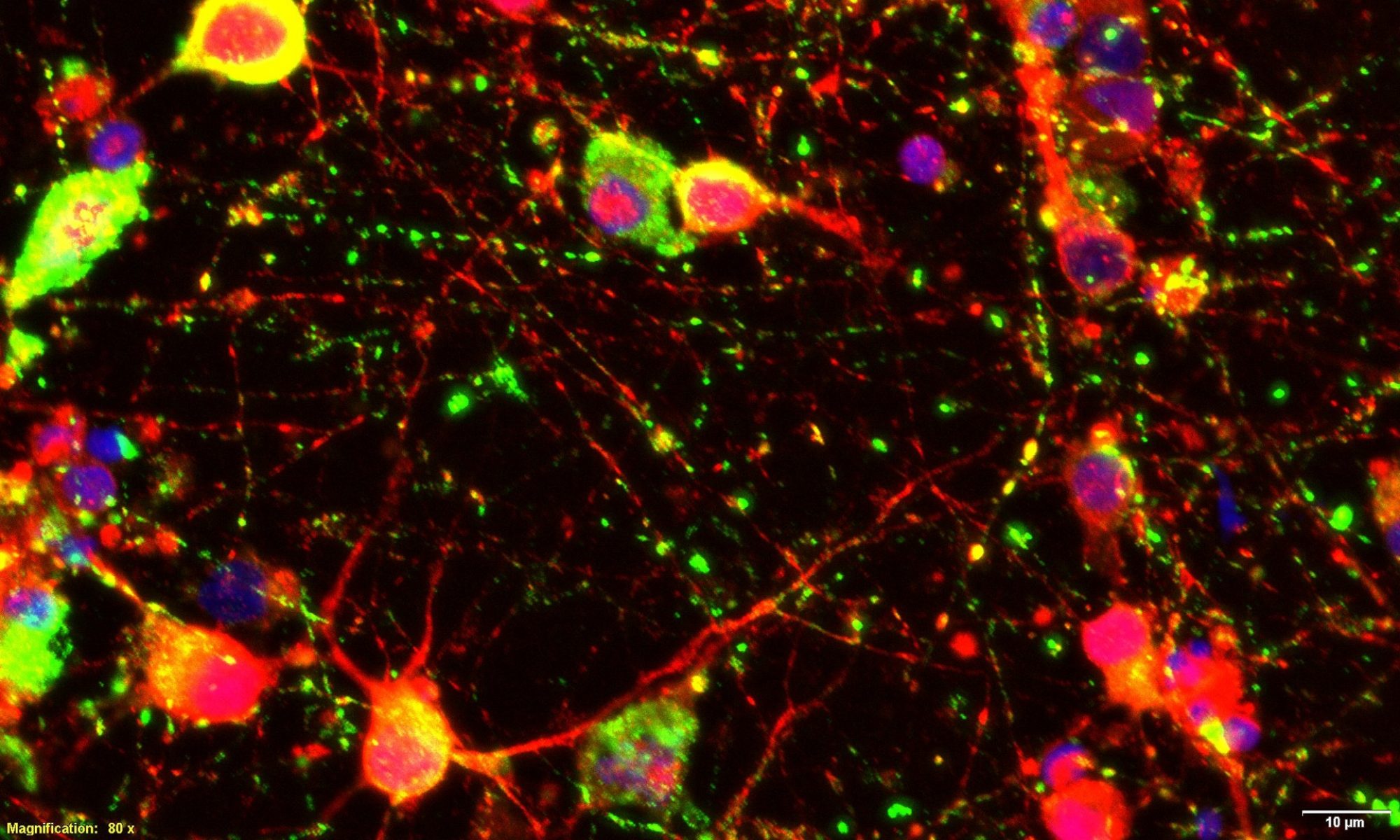
Dr. Sarah Hernandez, PhD
Postdoctoral Researcher
Sarah Hernandez
Research Interests:

I’m interested in defining and understanding Huntington’s disease (HD)-related changes in the extracellular matrix (ECM) to leverage for therapeutic intervention. In the brain, ECM molecules coordinate synaptogenesis and synaptic activity and, perhaps most relevantly, can provide neuroprotection. While there is clear evidence regarding the importance of ECM participation in critical CNS functions and neuronal dynamics, little is known about the role that the ECM plays in neurodegenerative diseases, including HD. ECM molecules have shown great promise as highly druggable targets. Therefore, taking advantage of the malleability of the ECM and the influence it has on neural plasticity may allow for the correction or compensation of changes in the HD brain.
Hobbies:
If I’m not in the lab I’m usually with my husband, Bret, and our dog, Selma, a pitbull-mix that we rescued when she was about 4 years old. We like to travel and will bring Selma with us anywhere we go that we can get to by car. We also have 2 rescue cats that enjoy spending their lives on our laps when we’re at home. I’m actively involved in the Huntington’s disease community, as an executive board member of HD-CARE, advisory board member of the UCI HDSA Center of Excellence, and editor for HDBuzz. I’m also an avid reader, yoga enthusiast, runner, and quite crafty!
Education:
Franklin Pierce University, Rindge, NH, BS, 05/2006, Biology/Chemistry
Worcester Polytechnic Institute, Worcester, MA, PhD, 12/2015, Biology and Biotechnology
Publications:
- Smith-Geater, C.*, Hernandez, S.J.*, Lim, R.G., Adam, M., Wu, J., Stocksdale, J., Wassie, B.T., Gold, M.P., Wang, K., Miramontes, R., Kpoan, L., Orellana, I., Joy, S., Kemp, P.J., Allen, N.D., Fraenkel, E., and Thompson, L.M. (*co-first authors) “Aberrant development corrected in adult-onset Huntington’s disease iPSC-derived neurons via WNT signaling modulation” Stem Cell Reports (2020).
- Ochaba, J., Fote, G., Kachemov, M., Thein, S., Yeung, S., Lau, A., Hernandez, S., Lim, R., Casale, M., Reidling, J., Pasparakis, M., Housman, D., Thompson, L., and Steffan, J. “IKKβ slows Huntington’s Disease progression in R6/1 mice.” Proceedings of the National Academy of Sciences22 (2019): 10952-10961.
- Morozko, E.L., Ochaba, J., Hernandez, S.J., Lau, A., Sanchez, I., Orellana, I., Kopan, L., Crapser, J., Duong, J.H., Overman, J. Yeung, S., Steffan, J., Reidling, J., and Thompson, L. “Longitudinal Biochemical Assay Analysis of Mutant Huntingtin Exon 1 Protein in R6/2 Mice.“ Journal of Huntington’s diseasePreprint (2018): 1-15.
- Geater, C*, Hernandez, S.J.*, Thompson, L., and Mattis, V. (*co-first authors) “Cellular Models: HD Patient-Derived Pluripotent Stem Cells.” Huntington’s Disease. 2018 (pp. 41-73). Humana Press, New York, NY.
- Gershlak J., Hernandez S.J., Fontana G., Perreault L., Hansen K., Larson S., Binder B., Dolivo D., Yang T., Dominko T., Rolle M., Weathers P., Medina-Bolivar F., Cramer C., Murphy W., and Gaudette G. “Crossing kingdoms: Using decellularized plants as perfusable tissue engineering scaffolds.” Biomaterials125 (2017): 13-22.
- Hernandez S.J., Dolivo D., and Dominko T. “PRMT8 demonstrates variant-specific expression in cancer cells and correlates with patient survival in breast, ovarian and gastric cancer.” Oncology letters3 (2017): 1983-1989.
- Hernandez, S, and Dominko, T. “Novel protein arginine methyltransferase 8 isoform is essential for cell proliferation.” Journal of cellular biochemistry9 (2016): 2056-2066.
- Dolivo, D., Hernandez, S.J., and Dominko, Tanja. “Cellular lifespan and senescence: a complex balance between multiple cellular pathways.” BioEssays38 (2016): S33-S44.
